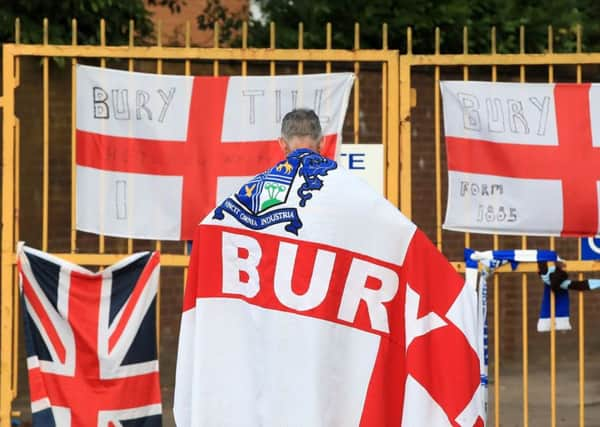Could your club follow Bury into oblivion? There’s a one in four chance!


That is the stark warning delivered by leading football finance expert Rob Wilson, who estimates that ‘20 to 25 per cent’ of EFL clubs are struggling to make ends meet as they seek to avoid the fate which recently befell Bury.
It is a message that should send a shudder down the spine of supporters who remember those dark times amid the fall-out of the collapse of the digital television firm in the early Noughties.
Advertisement
Hide AdAdvertisement
Hide AdHere in Yorkshire, the knock-on effect saw Barnsley placed into administration – in later years, then-chairman John Dennis spoke about how the collapse almost destroyed the club.
Others such as Huddersfield Town, Sheffield Wednesday and Rotherham United were also left feeling the pinch.
Recent financial figures make for grim reading.
Seventy-five per cent of EFL clubs recorded losses, with a combined deficit totalling £388m, in the latest accounts filed.
The likes of Reading, Southend, Morecambe and Oldham all missed wage payments last season and the travails of Bury and Bolton are far from isolated in the view of Wilson.
Advertisement
Hide AdAdvertisement
Hide AdThe desperate events at Bury, who became the first team to drop out of the league since Maidstone’s liquidation in 1992, will increase government pressure on the embattled EFL to ‘get their house in order’ – with the governing body assigned with coming up with some answers fast.
“Yes, unequivocally it is the biggest issue facing clubs since ITV Digital,” Wilson told The Yorkshire Post. “I estimate that around 20 or 25 per cent of Football League clubs are living this ‘hand to mouth’ existence.
“Clubs seem to re-finance something, find another sponsorship or have a good cup run to almost stave off the inevitable.
“What I think is interesting about the Bury case is that the EFL have had their hands burnt, big time. They have been able to hide behind the veil of clubs being the members, setting the rules and being self-regulating.
Advertisement
Hide AdAdvertisement
Hide Ad“But this time, they have allowed an owner, in Steve Dale, to come in and make some really bad decisions to kill the club. They had also (previously) let Ken Anderson into Bolton, a guy who had been (previously) disqualified from directing companies for eight years, which is the biggest penalty you can get.
“There’s been a public outcry and the government are getting involved. Think a few years back with Ken Bates at Leeds and Damian Collins MP said there needed to be a public investigation and government intervention.
“I do not think it will go that far, but I think that the government pressure will force the EFL to be much more robust in their regulations now.”
In light of recent events, recriminations towards the EFL from Bury and Bolton supporters and fans’ groups across football for failing to disqualify owners like Dale or Anderson and preventing clubs from spending above their means are both understandable and justifiable.
Advertisement
Hide AdAdvertisement
Hide AdThe clamour for an independent body to be given greater regulatory powers in running football and for the government to start taking the lead has been similarly intense, with an independent review being one likely option, according to Wilson. “It would not surprise me if there was an independent review of what happened at Bury and what the EFL are doing as a governing body as they should rightly be under scrutiny now.
“One of those recommendations might be to have an independent regulator. They don’t tend to do it in professional sport. Fifa have an ethics committee which is supposed to be independent, but is not really.
“Some people are calling on the FA to do something, but it is not really their jurisdiction. There needs to be something between the Premier League and EFL to try and manage the situation more effectively.
“I have been outspoken in saying that parachute payments should be abolished and the EFL should be given that money to redistribute more equally as there is an issue with fairness of competition now.
Advertisement
Hide AdAdvertisement
Hide Ad“Financial Fair Play has not helped the situation, perversely. While it is intended to make sure clubs are a bit more financially sustainable – and they are better than they were five or six years ago – it has also prevented wealthy benefactors coming in and throwing money at it.
“You cannot have a Manchester City, Bournemouth or a Leicester City as rules do not permit it. That makes clubs less attractive acquisitions to owners.
“From a regulatory point of view, the very least that should happen is that the EFL insist that clubs produce management accounts and fully-worked budgets and business plans in advance of the season to quality for a ‘golden share’ (yearly league money).
“They would at least go some way to at least avoid what is happening with Bury and Bolton and games being cancelled.”